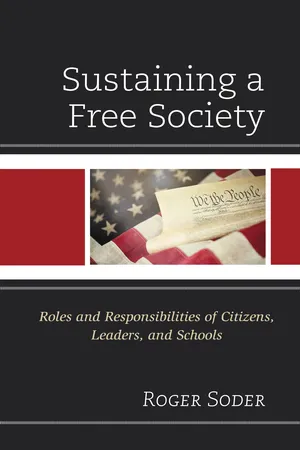
eBook - ePub
Sustaining a Free Society
Roles and Responsibilities of Citizens, Leaders, and Schools
- English
- ePUB (mobile friendly)
- Available on iOS & Android
eBook - ePub
About this book
It is difficult to create a free society but even more difficult to sustain that free society over time. We want to sustain the esssential elements of a free society, but at the same time, we must recognize that the world is always changing. How, then, to adjust to changes and to improve what we have, without losing sight of core values, is our focus in Sustaining A Free Society.
The book first outlines in practical real-world terms fifteen conditions that must be in place to sustain a free society. One critical condition given extended consideration is the need for a long-term time perspective. Conditions do not exist in the abstract: they are created by people and the choices we make. Thus we need to consider the roles and responsibilities of those involved in a free a society: citizens and those they choose as leaders. We are not born knowing our responsibilities as citizens and leaders: these matters have to be learned. Sustaining a Free Society moves to a consideration of the role schools must play in ensuring that future generations know and value a free society and are prepared to in turn assume their responsibilities.
The book first outlines in practical real-world terms fifteen conditions that must be in place to sustain a free society. One critical condition given extended consideration is the need for a long-term time perspective. Conditions do not exist in the abstract: they are created by people and the choices we make. Thus we need to consider the roles and responsibilities of those involved in a free a society: citizens and those they choose as leaders. We are not born knowing our responsibilities as citizens and leaders: these matters have to be learned. Sustaining a Free Society moves to a consideration of the role schools must play in ensuring that future generations know and value a free society and are prepared to in turn assume their responsibilities.
Frequently asked questions
Yes, you can cancel anytime from the Subscription tab in your account settings on the Perlego website. Your subscription will stay active until the end of your current billing period. Learn how to cancel your subscription.
No, books cannot be downloaded as external files, such as PDFs, for use outside of Perlego. However, you can download books within the Perlego app for offline reading on mobile or tablet. Learn more here.
Perlego offers two plans: Essential and Complete
- Essential is ideal for learners and professionals who enjoy exploring a wide range of subjects. Access the Essential Library with 800,000+ trusted titles and best-sellers across business, personal growth, and the humanities. Includes unlimited reading time and Standard Read Aloud voice.
- Complete: Perfect for advanced learners and researchers needing full, unrestricted access. Unlock 1.4M+ books across hundreds of subjects, including academic and specialized titles. The Complete Plan also includes advanced features like Premium Read Aloud and Research Assistant.
We are an online textbook subscription service, where you can get access to an entire online library for less than the price of a single book per month. With over 1 million books across 1000+ topics, we’ve got you covered! Learn more here.
Look out for the read-aloud symbol on your next book to see if you can listen to it. The read-aloud tool reads text aloud for you, highlighting the text as it is being read. You can pause it, speed it up and slow it down. Learn more here.
Yes! You can use the Perlego app on both iOS or Android devices to read anytime, anywhere — even offline. Perfect for commutes or when you’re on the go.
Please note we cannot support devices running on iOS 13 and Android 7 or earlier. Learn more about using the app.
Please note we cannot support devices running on iOS 13 and Android 7 or earlier. Learn more about using the app.
Yes, you can access Sustaining a Free Society by Roger Soder in PDF and/or ePUB format, as well as other popular books in Education & Behavioural Management. We have over one million books available in our catalogue for you to explore.
Information
Table of contents
- Cover
- Half Title Page
- Contents
- Preface
- Acknowledgments
- Introduction
- Chapter 1: Political and Cultural Conditions Necessary for a Free Society
- Chapter 2: Long-Term Perspective in a Free Society
- Chapter 3: Leadership in and for a Free Society
- Chapter 4: Citizens in and for a Free Society
- Chapter 5: Schools and the Sustaining of a Free Society
- Chapter 6: The Free Society: Reflections and Directions
- Bibliography
- About the Author